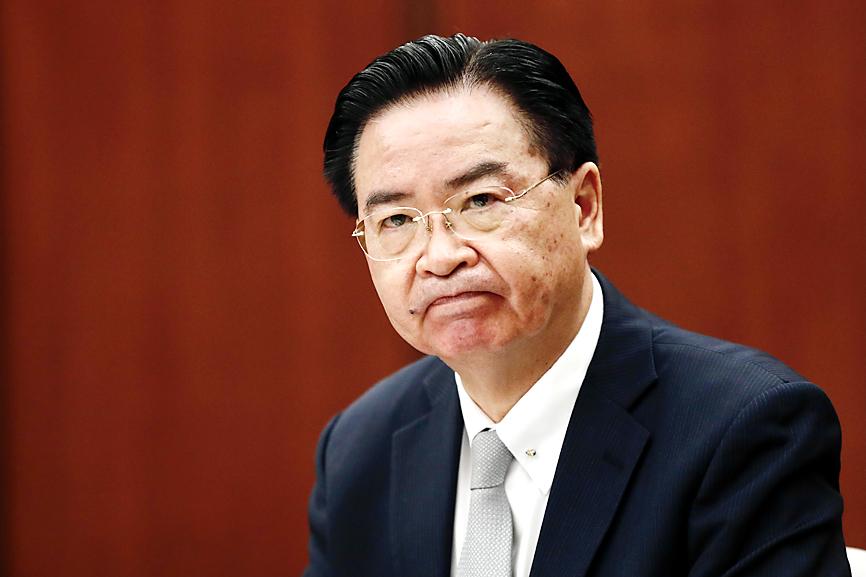Following reports that Washington is to retain the previous US administration’s directives on dealings with Taiwan, Minister of Foreign Affairs Joseph Wu (吳釗燮) yesterday said that existing US contact guidelines are still in place, as it is unclear how to proceed without them, but many had already been broken and future changes would be “very significant.”
Shortly before leaving office on Jan. 9, then-US secretary of state Mike Pompeo announced the annulment of all self-imposed guidelines regarding exchanges with Taiwan, paving the way for high-level visits and other official interactions.
However, since US President Joe Biden entered the White House, the status of the guidelines has been unclear.

Photo: EPA-EFE
When asked about their status during a report to the Legislative Yuan, Wu said that “adjustments are still being made.”
Ever since the guidelines were changed in 2015 for “various reasons,” reportedly in response to Taiwanese representatives raising the national flag at Twin Oaks Estate in Washington, the US has adopted a policy of making practical changes whenever needed, Wu said.
In this way, “many [guidelines] have already been broken,” he said.
As for whether Taiwan’s president, vice president or other high-ranking officials could visit Washington, Wu said that such visits are not covered by the guidelines.
However, this does not mean it would be impossible, he said, adding that the Ministry of Foreign Affairs would strive to arrange reciprocal visits if the need arises.
The US most recently granted permission for officials to attend events with Taiwanese representatives abroad, and to meet at foreign embassies or official residences, he said.
This is already a change from past practice that would likely make it into the new guidelines, Wu added.
“This is already a huge step,” he said. “Two years ago, for us to meet with a US ambassador in another country would have been extraordinarily difficult.”
While there have been such meetings in the past, they were uncommon until these past few months, nor were they so public, Department of North American Affairs Director-General Douglas Hsu (徐佑典) said, adding that Washington is now encouraging its diplomats to interact with their Taiwanese counterparts.
As for whether the meetings were simple formalities or involved substantive dialogue, Wu said that a few were courtesy visits, but in foreign affairs, formalities are sometimes very important.
In most of the meetings the representatives discussed areas of cooperation in their host nations, while some talked about international participation and regional issues, he added.
Communication with Washington would proceed with the knowledge that the US Department of State is evaluating how to adjust its guidelines, Wu said.
If the rules are eliminated, some within the department fear that all relations would refer back to the Taiwan Relations Act, and all bilateral interactions must be tackled through the Taiwan Council for US Affairs and the American Institute in Taiwan, making matters more confusing, he said.
“Without direct rules, the department would not know what to do,” Wu said, but added that the changes made by Biden’s administration would be significant.

POSITIVE DEVELOPMENT: Japan and the US are expected to hold in-depth discussions on Taiwan-related issues during the meeting next month, Japanese sources said The holding of a Japan-US leaders’ meeting ahead of US President Donald Trump’s visit to China is positive news for Taiwan, former Japan-Taiwan Exchange Association representative Hiroyasu Izumi said yesterday. After the Liberal Democratic Party’s landslide victory in Japan’s House of Representatives election, Japanese Prime Minister Sanae Takaichi is scheduled to visit the US next month, where she is to meet with Trump ahead of the US president’s planned visit to China from March 31 to April 2 for a meeting with Chinese President Xi Jinping (習近平). Japan and the US are expected to hold in-depth discussions on Taiwan-related issues during the

‘LIKE-MINDED PARTNER’: Tako van Popta said it would be inappropriate to delay signing the deal with Taiwan because of China, adding he would promote the issue Canadian senators have stressed Taiwan’s importance for international trade and expressed enthusiasm for ensuring the Taiwan-Canada trade cooperation framework agreement is implemented this year. Representative to Canada Harry Tseng (曾厚仁) in an interview with the Central News Agency (CNA) said he was increasingly uneasy about Ottawa’s delays in signing the agreement, especially as Ottawa has warmed toward Beijing. There are “no negotiations left. Not only [is it] initialed, we have three versions of the text ready: English, French and Mandarin,” Tseng said. “That tells you how close we are to the final signature.” Tseng said that he hoped Canadian Prime Minister Mark Carney

President William Lai (賴清德) yesterday bestowed one of Taiwan’s highest honors on Saint Vincent and the Grenadines (SVG) Ambassador Andrea Clare Bowman in recognition of her contributions to bilateral ties. “By conferring the Order of Brilliant Star with Grand Cordon on Ambassador Bowman today, I want to sincerely thank her, on behalf of the Taiwanese people, for her outstanding contribution to deepening diplomatic ties between Taiwan and SVG,” Lai said at a ceremony held at the Presidential Office in Taipei. He noted that Bowman became SVG’s first ambassador to Taiwan in 2019 and

A man walks past elementary school artworks at the Taipei Lantern Festival in Ximen District yesterday, the first day of the event. The festival is to run from 5pm to 10pm through March 15.